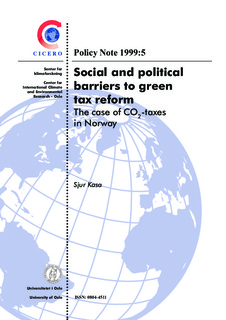| dc.contributor.author | Kasa, Sjur | nb_NO |
| dc.date.accessioned | 2014-03-17T14:28:48Z | |
| dc.date.available | 2014-03-17T14:28:48Z | |
| dc.date.issued | 1999 | nb_NO |
| dc.identifier.issn | 0804-4511 | nb_NO |
| dc.identifier.uri | http://hdl.handle.net/11250/191820 | |
| dc.description.abstract | In this paper, I present the story of several attempts to tax Norwegian mainland emission intensive industries during the 1990s. These industries, mainly made up of aluminium and ferro-alloy producers located in the Norwegian countryside, and a series of planned gas-powered power stations along the coast, have enjoyed full exemption from CO2-taxes during a period in which realtively high CO2-taxes have been imposed on Norwegian consumers and some other industries.
The various sources of the superior power of the emission intensive industries are explored, included their ability to amass broad support for "pro-industrial" social norms among politicians, media and the bureaucracy. Theoretically, these capabilities are described in terms of the policy network approach developed in British political science. | nb_NO |
| dc.language.iso | eng | nb_NO |
| dc.publisher | CICERO Center for International Climate and Environmental Research - Oslo | nb_NO |
| dc.relation.ispartof | CICERO Policy Note | nb_NO |
| dc.relation.ispartofseries | CICERO Policy Note;1999:05 | nb_NO |
| dc.title | Social and political barriers to green tax reform: The case of CO2-taxes in Norway | nb_NO |
| dc.type | Working paper | nb_NO |
| dc.source.pagenumber | | nb_NO |
| dc.identifier.cristin | 1046313 | |
